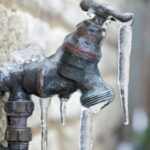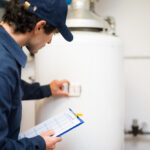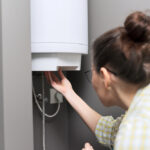Latest News & Articles
- How to Tell If Pipes are Frozen
 Kentucky’s average low winter temperatures range from 25–29°F, well below freezing. These low overnight temperatures and sudden cold snaps can cause pipes to freeze. Frozen…
Kentucky’s average low winter temperatures range from 25–29°F, well below freezing. These low overnight temperatures and sudden cold snaps can cause pipes to freeze. Frozen… - Signs it’s Time to Replace Your Water Heater
 Water heaters are essential to maintaining home comfort. One day, you may wake up and go take a shower, only to find that you have…
Water heaters are essential to maintaining home comfort. One day, you may wake up and go take a shower, only to find that you have… - Clogged Drain: A Holiday Plumbing Emergency
 During the holiday season, you may feel extra stressed hosting family and friends for festive celebrations. It’s meant to be a time for glad tidings…
During the holiday season, you may feel extra stressed hosting family and friends for festive celebrations. It’s meant to be a time for glad tidings… - DIY Nightmares: When Kitchen & Bathroom Projects Go Wrong
 They thought it looked easy on YouTube to replace a kitchen sink… Little did they know; it was much more than they could handle on…
They thought it looked easy on YouTube to replace a kitchen sink… Little did they know; it was much more than they could handle on… - How to Flush a Tankless Water Heater
 A tankless water heater offers homeowners efficiency and an endless hot water supply without a storage tank. However, regular flushing is critical to preventing mineral…
A tankless water heater offers homeowners efficiency and an endless hot water supply without a storage tank. However, regular flushing is critical to preventing mineral… - Do I Need a Whole House Generator?
 Power outages are a huge inconvenience and can happen almost any time in Kentucky due to storms, ice, or other extreme weather. Many homeowners in…
Power outages are a huge inconvenience and can happen almost any time in Kentucky due to storms, ice, or other extreme weather. Many homeowners in…